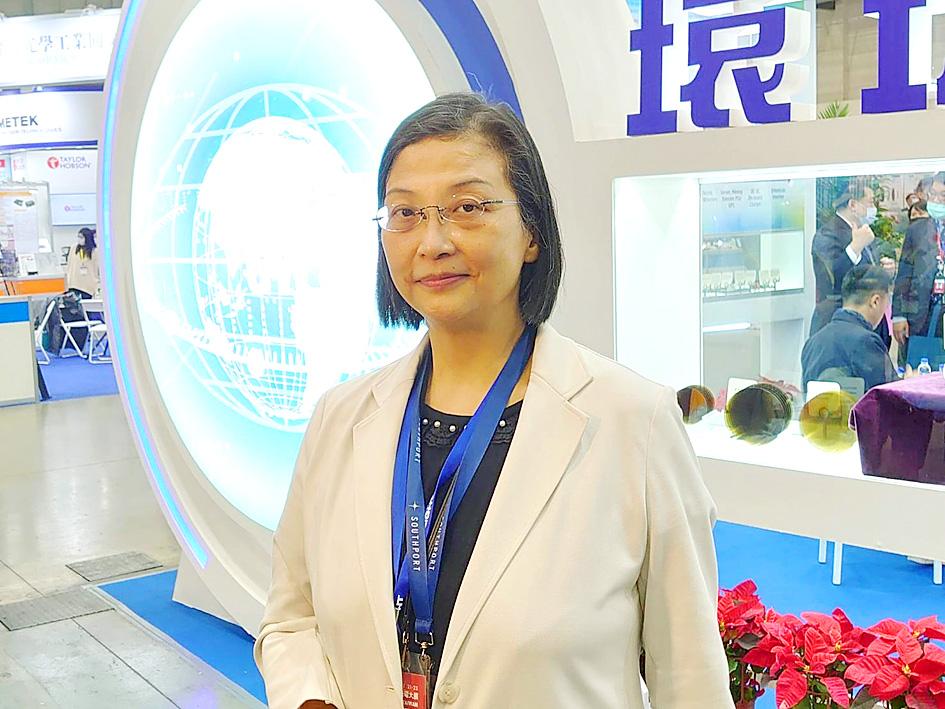GlobalWafers Co (環球晶圓), the world’s third-largest silicon wafer maker, yesterday said that Samsung Electronics Co and most of its customers have not scaled back on orders, or delayed shipments, even though consumer spending has shifted away from smartphones and notebook computers due to mounting inflation pressures.
Rising inflation has altered consumers’ spending habits, dampening sales of consumer electronics, the Hsinchu-based company said.
However, customers all honored their supply agreements by adjusting their product mix and shifting to applications that are still reporting robust growth, it said.

Photo: CNA
Aside from one 6-inch factory, GlobalWafers’ 15 factories around the world are running at 100 percent utilization, the company said, adding that they would continue running at full capacity until the end of this year, thanks to increasing demand.
“Up to now, we did not feel the squeeze from Samsung. We do not see any impact on wafer [supply] at all,” GlobalWafers chairwoman Doris Hsu (徐秀蘭) told a virtual media briefing after the company’s annual shareholders’ meeting in Hsinchu.
“Most customers who ordered 8-inch and 12-inch wafers do not intend to cut the amount, or delay shipments, even though some customers are seeing slow demand for display driver ICs. They have just altered their product mix to cope with it,” Hsu said.
GlobalWafers has continued to sign new long-term agreements (LTAs) for supply — some lasting until 2031 and most exceeding 2028, Hsu said.
The company is still in talks to sign contracts primarily for the supply of 12-inch wafers, as well as 8-inch float zone wafers with high-purity silicon, she said.
“Demand is still on the rise. Customers have expressed a strong willingness to sign new LTAs,” Hsu said.
Based on a new agreement with its customers, GlobalWafers expects its wafer average selling prices to continue to increase this year and next year, she said.
LTAs guarantee fixed wafer supply at fixed prices.
Asked if GlobalWafers would consider suspending its plan to construct a new factory amid rising oversupply concerns, Hsu said that the industry’s short-term ups and downs would not affect the company’s capacity expansion plans.
“Semiconductor demand will be back on the growth track in the long term. This is not going to change,” she said, adding that 5G-related devices, artificial intelligence, autonomous vehicles and emerging technologies would drive demand.
GlobalWafers plans to announce the location of a new fab by the end of this month, Hsu said.
The firm has removed Japan, where it already has five factories, and Southeast Asian nations, including Singapore, from its short list.
GlobalWafers in February unveiled a series of greenfield and brownfield capacity investment plans worth NT$100 billion (US$3.37 billion) in total.
The company’s shareholders yesterday approved a plan to distribute a cash dividend of NT$16 per common share. That represented a payout ratio of 58.67 percent based on the company’s earnings per share of NT$27.27.

Taiwan’s long-term economic competitiveness will hinge not only on national champions like Taiwan Semiconductor Manufacturing Co. (TSMC, 台積電) but also on the widespread adoption of artificial intelligence (AI) and other emerging technologies, a US-based scholar has said. At a lecture in Taipei on Tuesday, Jeffrey Ding, assistant professor of political science at the George Washington University and author of "Technology and the Rise of Great Powers," argued that historical experience shows that general-purpose technologies (GPTs) — such as electricity, computers and now AI — shape long-term economic advantages through their diffusion across the broader economy. "What really matters is not who pioneers

In a high-security Shenzhen laboratory, Chinese scientists have built what Washington has spent years trying to prevent: a prototype of a machine capable of producing the cutting-edge semiconductor chips that power artificial intelligence (AI), smartphones and weapons central to Western military dominance, Reuters has learned. Completed early this year and undergoing testing, the prototype fills nearly an entire factory floor. It was built by a team of former engineers from Dutch semiconductor giant ASML who reverse-engineered the company’s extreme ultraviolet lithography (EUV) machines, according to two people with knowledge of the project. EUV machines sit at the heart of a technological Cold

TAIWAN VALUE CHAIN: Foxtron is to fully own Luxgen following the transaction and it plans to launch a new electric model, the Foxtron Bria, in Taiwan next year Yulon Motor Co (裕隆汽車) yesterday said that its board of directors approved the disposal of its electric vehicle (EV) unit, Luxgen Motor Co (納智捷汽車), to Foxtron Vehicle Technologies Co (鴻華先進) for NT$787.6 million (US$24.98 million). Foxtron, a half-half joint venture between Yulon affiliate Hua-Chuang Automobile Information Technical Center Co (華創車電) and Hon Hai Precision Industry Co (鴻海精密), expects to wrap up the deal in the first quarter of next year. Foxtron would fully own Luxgen following the transaction, including five car distributing companies, outlets and all employees. The deal is subject to the approval of the Fair Trade Commission, Foxtron said. “Foxtron will be

INFLATION CONSIDERATION: The BOJ governor said that it would ‘keep making appropriate decisions’ and would adjust depending on the economy and prices The Bank of Japan (BOJ) yesterday raised its benchmark interest rate to the highest in 30 years and said more increases are in the pipeline if conditions allow, in a sign of growing conviction that it can attain the stable inflation target it has pursued for more than a decade. Bank of Japan Governor Kazuo Ueda’s policy board increased the rate by 0.2 percentage points to 0.75 percent, in a unanimous decision, the bank said in a statement. The central bank cited the rising likelihood of its economic outlook being realized. The rate change was expected by all 50 economists surveyed by Bloomberg. The